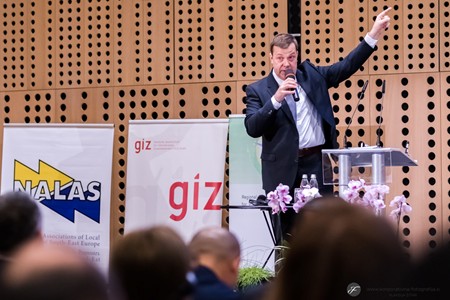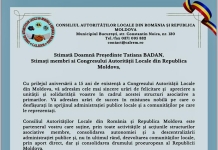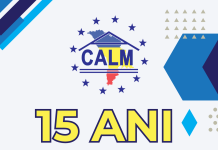What are the challenges in bringing 2030 Agenda and the Sustainable Development Goals (SDGs) closer to community level, how to achieve social inclusion and what is the way forward – all these questions are in the focus of the “Regional conference on social inclusion and (re)integration through 2030 Agenda and SDGs”, that takes place on 17 and 18 April 2018 in Brdo, Slovenia.

The conference provides a platform for over 120 local stakeholders, NGOs and representatives from national level in order to (1) improve mutual learning on successfully implemented community-based approaches to social inclusion and (re)integration, (2) increase awareness on the challenges in the municipalities and acknowledge the importance of collaboration within and between the countries among various stakeholders, (3) create awareness on the SDGs and migration, and (4) recommend approaches on social inclusion and (re) integration in the form of a bottom-up policy advice following the do-no-harm principle.



“The municipality must provide equal opportunities to all and involve all citizens in making it a place of wellbeing. I expect that this conference brings new ideas and opens interesting discussions on what we as Mayors and local governments can do to contribute to making the Sustainable Development Goals our reality. The way we need to undergo requires a strong commitment by all stakeholders, both at local and national level, so we are looking forward to join forces for the benefit of our citizens”, said in his opening address Mr. Mico Micic, President of NALAS and Mayor of Bijeljina, Bosnia and Herzegovina. “SDGs provide a huge potential got local governments to contribute to sustainable development. But, this is only possible if we understand them and take actions”, said Mr. Micic.

Dr. Ute Boettcher from GIZ elaborated one of the core principles of the SDGs, “Leaving no one behind”. “We shall now ask the question how can we reach to the ones that were used to be left behind, considering that it takes money, time and efforts. The three key things are to reach those disadvantaged groups, remove access barriers and creating supporting environment”, said Dr Boettcher. “I am glad to see that in the Balkans region you are way ahead by not only understanding SDGs, but also dedicating this conference to the core principle of “Leaving no one behind”.

Dr. Eva Dick, from the German Development Institute, focused on the relevance of SDGs for the local level, pointing out that 21% of the 169 targets can only be implemented by local actors, while 24% shall be implemented in partnership with them. Dr. Dick elaborated on why SDGs must go local, emphasising that they provide orientation for sustainable and integrated development planning; are a point of departure for monitoring, allow linking to sources of development finance and create a base for inter-sectorial exchange. Dr.Dick also shared best practices in localising SDGs from Germany, from cities like Cologne, Manheim and Bottrop.

The panel discussion: From Theory into practice: Challenges in bringing 2030 agenda and SDGs closer to community level shared various experiences in operationalising SDGs in different municipalities and improving services to vulnerable groups. Ms. Kathleen Depoorter, a Councilor of Evergem Municipality in Belgium spoke about her municipality experiences in implementing SDGs, learning from and exchanging with the municipality Guaranda in Ecuador. “We started from our international cooperation department and widened our SDGs support circle in the municipality. Now we have 17 employees, who, besides other tasks deal with localising SDGs”, said Ms. Depoorter.

Mayor Emanuil Manolov, from Pavlikeni, Bulgaria, presented the social services in Bulgaria and the innovative social services of Pavlikeni.
Mr. Thomas Prorok, from KDZ and the Austrian Association of Cities and Towns talked about the approach of the Austrian Association and Austrian cities and municipalities in localising SDGs. The Association works on developing Guidelines that provide advices and best practices for local governments on localising the SDGs. “The SDGs show how the World will look like in the future, 10-20 years from now, which is a great starting point and compass for all local governments in planning their local actions”, said Mr. Prorok.

Mr. Ugo Poli, from the Central European Initiative (CEI) spoke about the role of partnerships in addressing local needs. “The issue of partnership is an issue of effectiveness of governance”, said Mr. Poli.
In the afternoon session, using the World Café method, 8 groups discussed various aspects of SDGs implementation at local level and integration of voulnerable groups. The discussion groups focused on scanning the current situation related to Awareness; Advocacy; Implementation and Monitoring.




The second day of the “Regional conference on social inclusion and (re)integration through 2030 Agenda and SDGs” focused on action planning, providing recommendations and conclusions in each of the four areas.
The conference was organised by the Network of Associations of Local Authorities of South-East Europe (NALAS), supported by the GIZ regional project “Social Rights for Vulnerable Groups (SoRi)”, commissioned by the German Federal Ministry for Economic Cooperation and Development (BMZ).











